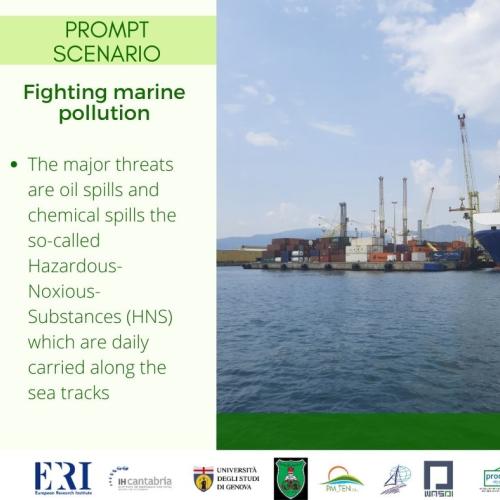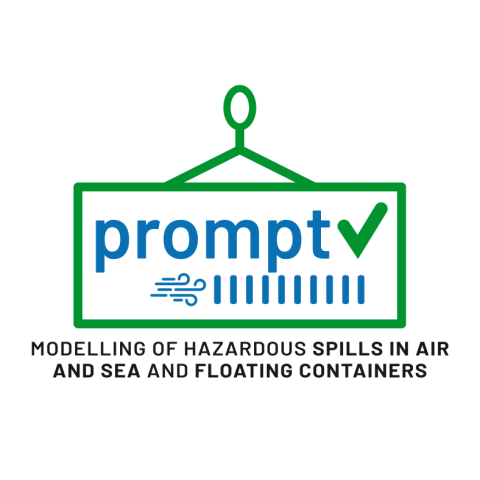
Background of PROMPT
Fighting marine pollution is a priority to safeguarding the environment. The major threats are oil spills and chemical spills, the so-called Hazardous-Noxious-Substances (HNS), which are daily carried along the sea tracks.

Fighting marine pollution is a priority to safeguarding the environment. The major threats are oil spills and chemical spills, the so-called Hazardous-Noxious-Substances (HNS), which are daily carried along the sea tracks. The dimension of the problem can be seized by analyzing the statistical data issued by the Agency EMSA which annually issues a detailed report on marine casualties and incidents.
In fact, according to EMSA, EU member states (MS) have reported more than 22000 occurrences of maritime accidents from 2014 to 2020. It is also quite interesting to analyze with more detail and some aspects that closely pertain to the project actions. A report has suggested that cargo ships are the most common category involved in marine incidents, followed by passenger ships. More interestingly, the location of the casualties and incidents is primarily in port areas and coastal waters (distance less than 12nm). These two locations cover more than 70% of the distribution of the total number of events, with a percentage of about 40% related to port areas. These data are a robust statistic for the entire time frame (2014-2020).
Moreover, several hundreds of cases of pollution were reported (413) with most cases where sea pollution was caused by the release of fuel or other chemical pollutants. It is also interesting to note that there is a percentage of accidents involving air pollution caused mainly by resulting fires and/or dispersion of chemical products in the atmosphere. To deal with such a threatening scenario, it is essential to enhance the level of preparedness, especially in the Mediterranean States that most probably bear the negative environmental and economic/social consequences.
Several International Conventions and Protocols (e.g. Barcelona) try to impose common to contrast marine pollution. At the same time, several EU directives indicate the marine environment as an essential economic resource, suggesting, however, the necessity to foster a balanced approach in order to increase human activity while preserving the ecological systems (e.g. ICZM and MSP directives). In this scenario, Mediterranean ports and maritime transport are the core of the Blue Growth and, at the same time, they represent high-risk activities. This is even more true for Nations such as Lebanon and Jordan where port activities are not always supported by an equivalent growth in measures dedicated to contrast marine pollution.
Nonetheless, it is well known that pollution response is most efficient if the actions are taken as soon as possible. In this regard, the ICT tool that helps in predicting the fate of contaminants in harbor and coastal waters and in the atmosphere could represent a step forward in contrasting marine pollution.
The project will concentrate its actions, especially in port areas, which are one of the most probable locations of marine spills. The general objective of the PROMPT project is to extend the capabilities of the ICT tool developed in the framework of the DG-ECHO project Be-Ready in order to:
The project has its main strength in the fact that almost all the partners already collaborated in a DG-ECHO project and due to the interest shown by the beneficiary partners (UJO and OEPT), the DSS tool developed in the framework of the BE-READY project will be extended to have new features and new capabilities related to the preparedness in contrasting water pollution and atmospheric dispersion of the volatile part of oil and NHS spills.
As for the previous project, the totality of ICT applications (numerical models, decision support system, storage, and analysis of data) will be implemented employing an open-source community-based modeling suite.
This aspect is important for the sustainability and continuation of the project after the two years of support by the DG-ECHO program because it allows public entities such as port authorities, coast guard, and regional authorities, to continue to employ the DSS tool without any additional costs such as licenses or similar.
Finally, the “scenario approach” employed by the system will allow the end users to have forecasts and predictions of the transport of oil and HNS contaminants in the sea and the atmosphere without having the computational costs of a classic dynamical forecast system.

Preparedness for Operational Monitoring and Prediction of contaminant Transport in the Sea
Sectors
Risk drivers
Thematic series